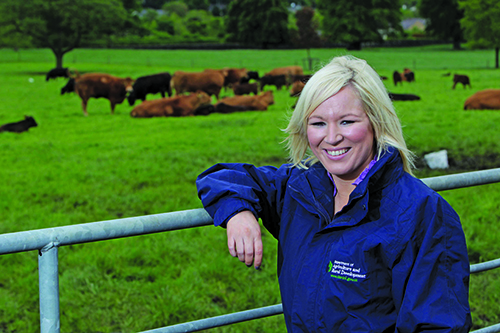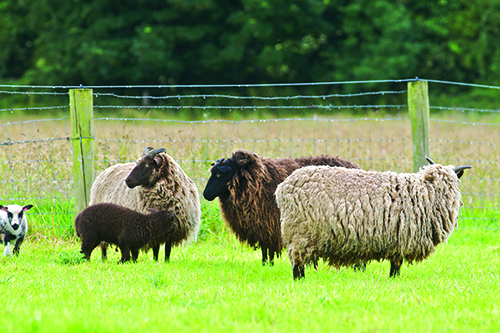Rebuilding trust in the agri-food sector
 Richard Halleron attended the inaugural meeting of the Supply Chain Forum where the Department of Agriculture and Rural Development Minister Michelle O’Neill called for better cooperation to tackle the challenges facing the agri-food industry.
Richard Halleron attended the inaugural meeting of the Supply Chain Forum where the Department of Agriculture and Rural Development Minister Michelle O’Neill called for better cooperation to tackle the challenges facing the agri-food industry.
“There is a need to rethink the traditional understanding of the supply chain to rebuild trust across the agri-food industry,” according to the Department of Agriculture and Rural Development Minister Michelle O’Neill. This was the key message that she recently delivered to the inaugural meeting of the Supply Chain Forum.
The event was attended by a high level representation of farmers, processors, retailers and other senior representatives, connected to Northern Ireland’s agri-food industry.
“The challenges we face provide a sharp focus on the nature and structure of the industry, particularly its vulnerability to the volatility of the global market,” said the Minister. “While the current crisis is caused by factors beyond our control, their impact can be influenced by what we do. While we produce world class food and drink, there are things that we can do better to ensure we are rewarded for the quality of our products.”
Effective communication
Tasking the Agri-Food Strategy Board (AFSB) to convene the Supply Chain Forum earlier this year, Minister O’Neill said she was determined to drive effective communication and collaboration across the agri-food supply chain.
She also stated her belief that supply chains have become fragmented within the agri-food sector. This fragmentation leads to insufficient margins for all. Ideally, she wants to see all players in the sector sharing equitably in the risks and rewards for their hard work.
“There is a need to revisit the traditional understanding of a supply chain, to build strong relationships between producers, processors, retailers, the food service industry and other key players, such as banks and feed merchants,” she said. “This will be necessary to improve transparency and communication; and rebuild trust and confidence across the supply chain.”
The Minister told those gathered that many of the industry’s long-term competitors come from outside the island of Ireland, and it is only by working together that the industry can hope to compete globally.
The department’s strategy to address this global challenge is called Going for Growth. It is based on the premise of a single supply chain that is integrated, sustainable and profitable and focused on delivering the needs of the market. It calls on government and industry to work together and is about adding value across the supply chain by meeting the customers’ needs.
In the Minister’s opinion this strategy “requires a new approach, to ensure we all work more closely. We need to produce the right food at the right time for our customers.” It is her belief that the only way to do this is by ensuring that all parts of the supply chain know what they are supposed to be doing and understand how their operations impact on the rest of the supply chain. This, she believes can only be achieved through “enhanced two-way, continuous communication.”
The Minister said the Supply Chain Forum must be the starting point in improving communication within the industry. Delegates at the conference received a number of presentations designed to illustrate the market context and to highlight what it is that the market wants.
“Be in no doubt, I am committed to the long-term sustainability of the entire agri-food sector,” said Minister O’Neill. “I am working hard to open up new markets. I have secured the largest ever Rural Development Programme funding. This funding will provide farmers with the skills, training and investment that they need to improve how they produce; and provide processors with financial support to innovate. I will continue to promote and represent the interests of the sector, whether at home or abroad. But it is only in partnership with the industry, that we can deliver the full potential of our agri-food sector.”
 Referring to the specific challenges facing the milk industry, O’Neill said that she was fully aware of the financial pressure that dairy farmers have been under over recent months. “To this end I met the banks and had formal discussions with DEFRA in London plus representatives of the European Commission. Specifically, I had requested an increase in dairy intervention prices.”
Referring to the specific challenges facing the milk industry, O’Neill said that she was fully aware of the financial pressure that dairy farmers have been under over recent months. “To this end I met the banks and had formal discussions with DEFRA in London plus representatives of the European Commission. Specifically, I had requested an increase in dairy intervention prices.”
Bright future
In general terms, the Minister believes that farming and food in Northern Ireland can look forward to a bright future, both in 2015 and beyond. Her confidence is centred on the industry’s ability to successfully export its output to a large number of countries world-wide.
“I am very aware of the fact that the Euro has weakened significantly against sterling over recent weeks,” she said. “But Europe is only one of the export markets that we can target. Countries such as China, Australia and the United States are potentially lucrative outlets for food produced in the North.”
Commenting further on the potential to develop food exporting opportunities to China, O’Neill confirmed that she has visited that country on a number of occasions in order to facilitate the needs of the pork sector.
“Doing business with the Chinese is all about developing good political relations with that country,” Minister O’Neill said. “To that end we have made a good start. I have already visited the country twice and will go again if the pork processing sector believes that such a gesture is required on my part.”
The Minister is very aware of the strides made by the government in Dublin to forge stronger trading relationships with the United States of America and other countries around the world. She highlighted the recent decision taken by the authorities in the United States to green light Irish beef imports as a case in point.
“There is a cross border working group in place which allows the interests of the North to be fully recognised when it comes to meeting the strategic needs of farming and food sectors. I also have a good working relationship with the European Union’s Agriculture Commissioner Phil Hogan and my counterparts in Department for Environment Food and Rural Affairs,” she said.
“So there are a number of options open to me when it comes to ensuring that the needs of local farmers and food processers are communicated to the key decision makes within Europe and beyond.”
The Minister confirmed that the Executive at Stormont fully recognises the needs of the farming and food industry moving forward.
“Ministers have an agreed vision and strategy for the farming and food sectors. We have already made £250 million of funding available to help drive the Farm Business Improvement Scheme, which is a fundamental driver of the new rural development programme.“There is also a close working relationship between my own department and DETI.”
The Minister went on to confirm that Brussels has now approved the new rural development programme.
“We submitted a plan that will provide us with significant flexibility, in terms of its overall implementation,” she said. “I am aware of the significance that farmers place on the implementation of the Farm Business Improvement Scheme. The first step in this process will be the establishment of business development groups, which will allow producers to develop the business plans they need to identify their specific opportunities for growth during the period ahead.
“Full details relating to the working of these new groups will be forthcoming in the very near future. However, their operation will require a strategic input on the part of DARD staff.”





